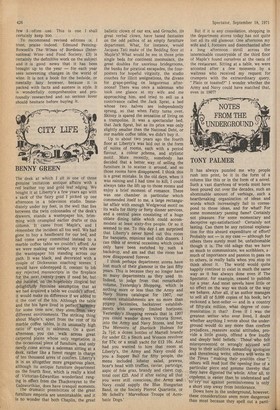BENNY GREEN
The desk at which I sit is one of those genuine imitation antique affairs with a red leather top and gold leaf edging. We bought it at Liberty's a few years ago with a sack of the fairy gold I picked up one afternoon in a television studio. Immediately under my feet, in the well that lies between the twin colonnades of the desk's drawers, stands a wastepaper bin, brimming with crumpled earlier drafts of this column. It came from Maple's, and I remember the incident all too well. We had gone to buy a headboard for our bed, and had come away committed instead to a marble coffee table we couldn't afford. As we were making our escape, my wife saw the wastepaper bin standing across our path. It was black, and decorated with a couple of Dickensian coaching scenes. I would have sidestepped it, content to lob my rejected manuscripts in the fireplace for the next twenty ,years if need be, but she insisted, on the hopelessly illogical but delightfully feminine assumption that as We had acquired a table we couldn't afford, it would make no difference if we added to it the cost of the bin. Although the table and the bin have lived in perfectllatmony for some time now, they stem'from'very different environments. The striking thing about Maple's, apart from the cost of its marble coffee tables, is its unusually high ratio of space to salesmen. On a quiet afternoon you can walk across great carpeted plains whose only vegetation is the occasional piece of furniture, and only rarely, come across a salesman sitting at a desk, rather like a forest ranger in charge of ten thousand acres of conifers. Liberty's is in an altogether more gregarious place, although its antique furniture department on the fourth floor, which is really a kind of Victorian-Edwardian wonderland ranging in effect from the Thackerayan to the Galsworthian, does have tranquil moments. l'he dramatic possibilities of the great furniture emporia are unmistakable, and it Is no wonder that both Chaplin, the great balletic clown of our era, and Groucho, its great verbal clown, have based fantasies on the odd pathos of an empty furniture department. What, for instance, would Jacques Tati make of the Bedding floor at Maple's? What would he see in those prim single beds for continent insomniacs, the great doubles for uxorious bridegrooms, the bunks for piratical escapades, the fourposters for hopeful virginity, the studio couches for illicit assignations, the divans for grape-peeling on languorous afternoons? There was once a salesman who took one glance at my wife and me approaching him, and tried to sell us a contrivance called the Jack Sprat, a bed whose two halves are independently sprung, so that when Fatty turns over, Skinny is spared the sensation of living on a trampoline. It was a spectacular bed, that Jack Sprat, but as its price was only slightly smaller than the National Debt, or our marble coffee table, we didn't buy it.
Up to about two years ago the fourth floor at Liberty's was laid out in the form of suites of rooms, each with a period flavour, a colour scheme, and stylistic motif. More recently, somebody has decided that a better way of selling the furniture is to scatter it around, and so those rooms have disappeared. I think this is a great mistake. In the old days, when it was raining and I had time to kill, I could always take the lift up to those rooms and enjoy a brief moment of romance. There was one chamber in particular which commended itself to me, a large rectangular affair with enough Wedgwood motif on its walls for thirty or forty dinner services, and a central piece consisting of a huge oblate dining table which could accommodate at least sixty-five people. Or so it seemed to me. To this day I am surprised that Liberty's never hired out this room for banquets, reunions and club dinners. I can think of several occasions which could only have been enriched by such a backdrop, and am sad that the room has now disappeared forever.
I think perhaps department stores have lost much of their glamour in the last fifty years. This is because they no longer have so many departments as they used to. Indeed, to judge from that remarkable volume, Yesterday's Shopping, which is nothing more or less than the Army and Navy Stores catalogue for 1907, our modern establishments are no more than pygmy facsimiles, backstreet establishments with severely limited horizons. Yesterday's Shopping reveals that in 1907 you could wander down Victoria Street, into the Army and Navy Stores, and buy The Memoirs of Sherlock Holmes for 2s 74d; a dozen bottles of Martell brandy for under £2; a Smith and Wesson revolver for 57s; or a small yacht for £12 10s. And had you wanted to hire that room at Liberty's, the Army and Navy could do you a Supper Ball for fifty people, the menu included lobster salad, prawns, boar's head with truffles, caviar, partridge, aspic of foie gras, brandy and claret cup, total cost £25. And if after eating all that you were still conscious, the• Army and Navy could supply the Blue Hungarian Band, or the Society Pierrot Quartette, or Mr Schell's 'Marvellous Troupe of Acrobatic Dogs.' But if it is any consolation, shopping in the department stores today has not quite lost all its old glamour. One afternoon my wife and I, footsore and disenchanted after a long afternoon stroll across the interminable countryside of the third floor of Maple's found ourselves at the oasis of the restaurant. Sitting at a table, we were accosted after a few moments by a waitress who received my request for crumpets with the extraordinary query, "Plain or toasted?" I wonder whether the Army and Navy could have matched that, even in 1907?


































 Previous page
Previous page